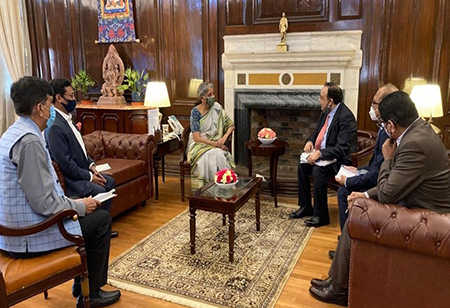The Commodity Participants Association of India (CPAI), the pan-India apex association of commodity market participants, today met the Hon'ble Finance Minister Smt. Nirmala Sitharaman for seeking her immediate intervention and policy support following a sharp decline in the volumes of exchange-traded commodities.
During the meeting, the CPAI representatives tabled their concerns pertaining to current challenges and hurdles that the industry is facing, which are contributing to diminishing liquidity on Indian commodity exchanges.
Commodity markets’ average daily turnover (ADT) has shrunk further by 27% between February and March 2021.Equity markets have also seen a sharp fall of 19% in ADT in this period, while equity futures volumes are down by 14%.
Mr. Narinder Wadhwa, President, CPAI, said: “In today’s pandemic times, when GoI is supporting industries with schemes like production-linked incentive (PLI), commodity market participants have also urged the MoF for policy support to improve market depth and liquidity, and enable India to emerge as a price setter of commodities.
We are extremely thankful to the Hon’ble Finance Minister Smt. Nirmala Sitharaman for giving us a patient hearing and considering our submissions. Implementing our suggestions will reduce the cost of hedging in commodity markets, bring ease of doing business.”
CPAI has placed their concerns and sought the FM’s intervention on three key issues:
1. Amending IGST Act owing to the challenges faced by market participants while delivering / receiving goods at the designated centres.
All trades which result in delivery on the Exchange Platform are covered under IGST except for where the buyer and seller are located in the same state. if the buyer and seller are located in different states from the place of delivery, challenges are faced by market participants on IGST registrations, which increases their compliance burden.
CPAI, therefore, urged the FM to suitably amend the IGST Act in order to allow the seller of commodities to raise the tax invoice from the state where he is already registered. It also urged FM to do away with the need of obtaining a casual taxable person registration in the state where the accredited warehouse is located.
CPAI further submitted that the place of supply of goods should be the registered address of buyer and not the physical location of the goods at the time of delivery – either actual or constructive.
2. Rationalising the peak margin requirement to maintain market depth and turnover SEBI implemented a peak margin requirement for all clients from 1st Dec 2020.
Under the plan, clients were to be allowed reduced leverage on intraday positions in phases. As per the schedule, peak margin obligation of client was 25% from 01/12/2020, 50% from 01/03/2021, 75% from 01/06/2021 and 100% from 01/09/2021.
With margins slated to increase as per schedule, markets are likely to witness a significant drop in volumes and participation. The same can also be observed from the trend in equity markets where volumes, especially intraday volumes have shifted from equity and futures markets (down 19 % and 14 % month on month) where the margin is higher to options markets (up 16 % month on month) where the margin is lower, particularly when options are purchased.Our markets are already saddled with higher costs as compared to global markets. A large part of the costs is regulatory costs.
Further with the increased margin requirements on day trades, overall liquidity and depth could go down further.
CPAI, therefore, urged the FM to help the industry for rationalising Peak Margin requirement to maintain market depth and turnover.
3. Rationalising cost of transactions:
The cost of transaction started increasing from 2004 when STT was introduced and incidentally the Turnover to Market Ratio fell more steeply when section 88E was withdrawn in 2008 & STT started getting treated as an expense instead of a tax.
Although Market Cap increased by 194% (from 51.38 lacs crore in 2008-9 to 151.08 lacs crore in 2018-19) but Ratio of Turnover to Market Cap fell. The Govt Revenue & Cash Market Volumes did not keep up at same pace. The Daily Spot Volume Grew By 72%- much below its potential especially when Market Cap has grown much higher. STT grew by merely 28% from Rs 8576 crore to Rs 11000 crore.
Similarly, introduction of CTT in 2012 led to a sharp fall in commodity market volumes as well. After CTT introduction, volumes on MCX fell 60% from 2012 to 2019. Govt also could collect Rs 667 crore as CTT in 2018-19 while it hoped to collect Rs 2000 crore.
The volumes of Indian commodity exchanges have been falling over the last decade due to challenges on ease of doing business, taxation, costs and compliance norms.
Since the Commodity exchange industry in India is still in its nascent stage, CPAI said the finance minister’s intervention to address the existing hurdles will go a long way in changing the future of this industry.
